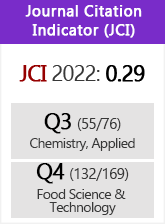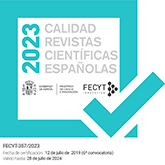Vitamins
DOI:
https://doi.org/10.3989/gya.1998.v49.i3-4.738Keywords:
Deep-frying, Thermal processing, Vitamins.Abstract
A thermal treatment is an intrinsic part of most food processing procedures and may be employed to inactive enzimes and toxic '• factors, to change texture and flavour or to preserve. The vitamin degree of transformation or destruction in cooking methods depends on the temperature and on the time of exposure to this temperature. Oxigen, light and transition metals frequently play an active role in accelerating or promoting vitamin losses. Both chemical change and difussion proceed more rapidly as the temperature is raised. An advantage of deep frying consists of the fact that the temperature within the food does not exceed the temperature of the steam under the crust, and that frying times are in general very short compared to other cooking procedures. Another advantages may be the low content of dissolved oxygen in frying fats, and also in its high tocopherol content. There is no leaching of water-soluble vitamins in deep-frying. Speaking of vitamin stability we have to keep in mind that the concept of vitamins is a more physiological concept than a chemical one. The stability itself is not a property of the various vitamins but rather of the various chemical compounds sometimes called vitamers, of which a certain vitamin group consists. For practical purposes, vitamin losses should be considered only in foods wich substantially contribute to the vitamin supply of single people or population groups. There is little data in the literature about vitamin changes in deep-frying of food. However published experimental data on vitamin loses show that deep-frying is one of the most protective cooking procedures. For example, in ours results the vitamin C losses of stewed vegetable foods were twice higher than that of fried ones, (raw potatoes containing 19 mg/100g fresh weight, 13 mg/100 fried in olive oil, and 5 mg/100g stewed in the same oil).
Downloads
Download data is not yet available.
Downloads
Published
1998-08-30
How to Cite
1.
Ruiz-Roso B. Vitamins. Grasas aceites [Internet]. 1998Aug.30 [cited 2024Apr.27];49(3-4):347-51. Available from: https://grasasyaceites.revistas.csic.es/index.php/grasasyaceites/article/view/738
Issue
Section
Monography
License
Copyright (c) 1998 Consejo Superior de Investigaciones Científicas (CSIC)

This work is licensed under a Creative Commons Attribution 4.0 International License.
© CSIC. Manuscripts published in both the printed and online versions of this Journal are the property of Consejo Superior de Investigaciones Científicas, and quoting this source is a requirement for any partial or full reproduction.All contents of this electronic edition, except where otherwise noted, are distributed under a “Creative Commons Attribution 4.0 International” (CC BY 4.0) License. You may read here the basic information and the legal text of the license. The indication of the CC BY 4.0 License must be expressly stated in this way when necessary.
Self-archiving in repositories, personal webpages or similar, of any version other than the published by the Editor, is not allowed.
















